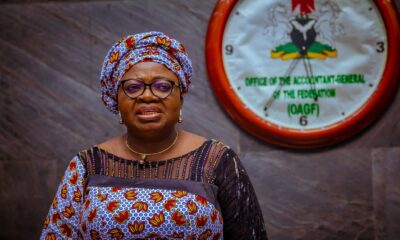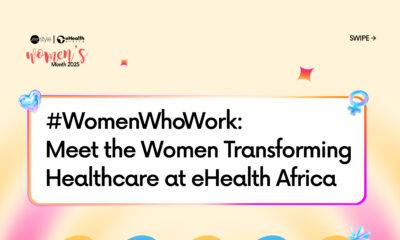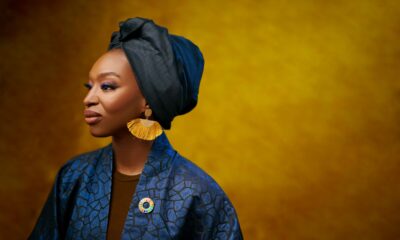Features
Meet Ikponwosa Ero, the United Nation’s Independent Expert on the Enjoyment of Human Rights by Persons with Albinism
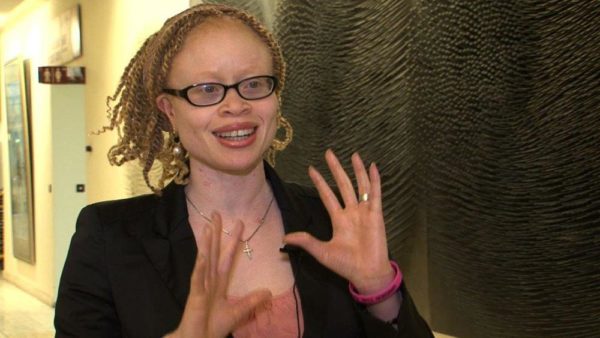 As part of BellaNaija‘s commitment to ensuring that we inform, educate and inspire, we partnered with the United Nations, Office of the Commissioner of Human Rights. {Click here to read about the collaboration here} The key focus of the partnership is to shed light on the issues affecting women’s rights in Africa.
As part of BellaNaija‘s commitment to ensuring that we inform, educate and inspire, we partnered with the United Nations, Office of the Commissioner of Human Rights. {Click here to read about the collaboration here} The key focus of the partnership is to shed light on the issues affecting women’s rights in Africa.
One of the major threats to the full human rights of women, is the stigma and discrimination against people living with albinism. We sat down to chat with the UN’s independent expert on the enjoyment of the human rights of person’s living with albinism – Ikponwosa Ero.
Nigerian born, IK is a woman living with albinism. She lived in Nigeria till her early teens, and she felt the cruel brunt of the Nigerian people. According to the report we received from the UN, several countries still harbour cultural practices where persons living with albinism hacked, and maimed, for body parts. Women living with albinism are raped because there are certain ritualistic practices which give the impression that this would bring wealth.
Today, IK shares her experience, garnered from years of being an advocate for persons living with albinism.
For starters, Ikponwosa ‘IK’ Ero broke it down the meaning of albinism:
“Albinism is a non-contagious, genetically inherited condition that affects people worldwide regardless of race or ethnicity. It results in a lack of pigmentation (melanin) in any or all of the hair, skin and eyes, causing vulnerability to the sun and bright light. As a result, most persons with albinism have a visual impairment of varying degrees and are prone to developing skin cancer. In almost all types of albinism, both parents must carry the gene for it to be passed on, even if they do not have albinism themselves.
When both parents carry the gene, then there is a 25 percent chance at each pregnancy that the child will have albinism. When both parents carry the gene, other children without albinism have a 50% chance of carrying the gene. Frequency of albinism in Africa is 1 in 5,000 to 1 in 15,000 with certain tribes exhibiting higher rates of 1 in 1,000. In Europe and in North America, frequency is 1 in 17,000 to 1 in 20,000. Among indigenous groups in Fiji and Panama, rates can be as high as 1 in 700 and 1 in 125 respectively. Higher frequencies can sometimes be explained by consanguineous relationships e.g. intermarriage among cousins such that the gene pool becomes tighter. “Person with albinism” is now preferred to “albino” because the former puts the person ahead of his condition while the latter equates him to it. This is the global trend as we see in the common phrases: persons with disabilities and persons with leprosy for example.”
In our interview with her, she walked us through her time in Nigeria, the things her family experienced, and most importantly, she tells us what to do when we meet people living with albinism.
***
You were 5 years old when you first found out the meaning of albinism, tell us some of the reactions you got from people around you and how it formed the person you are today.
The name-calling is most vivid in my memory. I could virtually not go anywhere without being called a name associated with albinism: afin! Oyinbo pepe! Unfortunate European!
I also remember the chanting of songs from other children – and sometimes adults. These events often came with feelings of helplessness. How do you even start to defend yourself against others that often outnumbered you? Essentially, it became very clear to me that upon encounter with anybody, my albinism would (understandably) be the first thing they saw and it would (unfortunately) be the only brush by which they would colour my personality and define expectations of me.
There were, however, a few people who did not do this. They seemed colour blind when they met me. They introduced themselves and just started conversing like I wasn’t different. This often threw me off at first and then a deep sense of appreciation would often arise in my heart. Interestingly enough I have ended up making friends from both groups: the mockers and the colour blind.
These experiences have certainly formed part of who I am today. From them, I learned that, first, quantity does not mean truth or rightness. Just because so many people decided to mock me due to my albinism does not mean they were right. Second, I learned to be patient with the rough start that sometimes accompanies some eventual good relationships. Above all, these experiences among many others that I cannot list here, have fueled my passion for the work I do today at the UN human rights council and around the world; namely, the advancement of enjoyment of human rights by persons with albinism.
Over the years, you’ve dedicated your life to working to ensure that people with Albinism are protected. Please share some of the most memorable stories you’ve had in the course of your work – both with the NGO -Under The Same Sun and as a UN rapporteur
My best memory is meeting Pope Francis in September 2014. I met him because of my work on persons with albinism. And what is more fascinating is I was introduced to him by Somalia’s Ambassador to the UN. (Who has since passed away. Yes, this is a sad story for another day). Nonetheless, meeting Pope Francis was a milestone. He listened about the situation of persons with albinism and blessed an image of persons with albinism from around the world. After that encounter, I just knew deep down that God was on our side; and in fact, he had ordained this time in history in response to the cries of many persons with albinism whose issues – unlike many others – had been left out of public discussion and forums for human advancement.
The second most memorable time was the acquisition of international albinism awareness day at the UN general assembly in November 2014. I worked on this resolution with the late Ambassador from Somalia, while in my position as international advocacy and legal officer at Under The Same Sun. Since then, every 13th of June, scores of countries around the world witness the roll out and showcase of albinism in various races and cultures. We celebrate what had been used to ascribe shame on us and we open discussion on the topic in ways that will definitely normalize the condition and allow all persons with albinism to begin to enjoy their human rights.
Albinism, and other forms of disability are at the base of a lot of jokes and stereotypes fostered by comedians, filmmakers – entertainers in general. As someone, living with albinism, what does all of that mean?
You don’t have to make fun of those who already suffer to be funny. In fact, some of the funniest comedians and entertainers in the world have achieved their success without mockery of vulnerable or marginalized groups. That said, I understand and appreciate freedom of expression and artistic freedom is part of that. It would just be responsible if your freedoms take into account the question of whether the people group you are about to mock have attained several avenues that shed positive light on them. If the answer is “no,” or you doubt it, then realise that you have the power to choose: positive change or maintaining the negative status quo. The choice is yours.
As the audience, what practical steps can we do to put an end to these things?
I recognize that people are free to do what they want as audience members. However, I would say that if for example, some people booed instead of laugh at the mockery of vulnerable or marginalized groups, I believe entertainers will quickly readjust. Again, the choice is theirs so all I can do is urge them to help in this way. I believe and hope that there will be a time in the near future when there would be such great awareness and positive understanding on albinism that mockery would have no power to maintain the negative status quo.
In your experience, what’s the first point of contact for eradicating stigma and the violent abuse against people living with Albinism?
Public education is key. Most people don’t understand what albinism is and are so confident in what they know – even when it is filled with errors. I have seen many comments online about albinism that are so far from the truth and yet they are repeated and pronounced as such.
People with albinism and their families also need to be educated on their condition so they can be advocates themselves. They are also in need of visual aids including, glasses, magnifiers and monocular so they can finish school and become manifested examples of the potential that every person with albinism bears.[Albinism often comes with a vision impairment. This is because pigmentation is necessary for eye development. Without the normal level of pigmentation, persons with albinism tend to have low vision and need to be seated in front of the class. If this doesn’t work, they should be allowed to photocopy teacher’s notes or that of other students so they can follow the curricula and do well at school]. Without an education, most people with albinism will end up working outdoors to survive. This in turn exposes them to skin cancer which continues to be the number one killer of this people group. Close to eighty percent of persons with albinism exhibit a stage of skin cancer which will kill them if left untreated. In some countries in the region, only 2 percent live beyond age 40. Most will die from this preventable cancer.
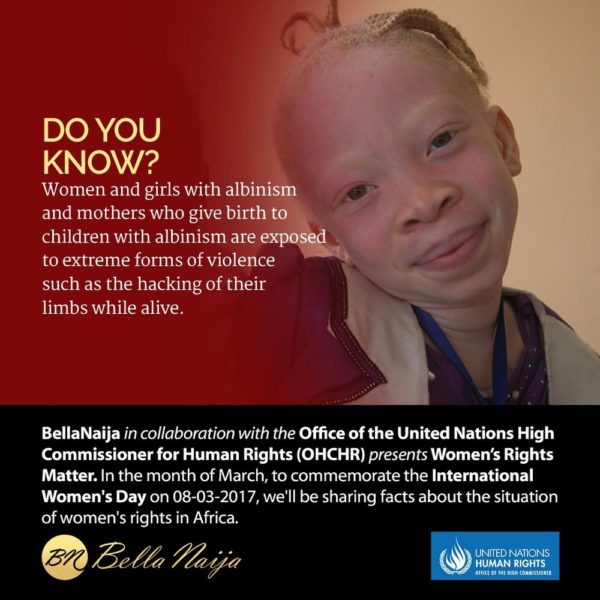 A lot of times, new reports focus on people living with the condition, without really shedding light on the effect on the families. Can you give us an insight into some of what your Mum (or family in general) had to deal with within the society – having a child with Albinism?
A lot of times, new reports focus on people living with the condition, without really shedding light on the effect on the families. Can you give us an insight into some of what your Mum (or family in general) had to deal with within the society – having a child with Albinism?
Mothers of children with albinism are often abandoned after being accused of infidelity or giving birth to an accursed or abnormal child. This pressure sometimes leads mothers to commit infanticide on their babies. Whole families including siblings can be excluded or ostracized for having a member with albinism. Accordingly, one WHO article in 2006 called for albinism to be treated as a public health issue extending support to family members.
In my case, my parents knew albinism could occur from two “black” parents but the question was who brought the condition to this child? They argued and only stopped when both recalled that one of my distant parental uncles who had passed prior to my birth also had albinism. It would take another 20 years before I learned and broke the news to them that in fact, BOTH of them carried the gene, hence why I was born this way. One parent alone cannot cause albinism.
About 5 years ago, when I finally had the courage to ask my mother what she went through, she could barely hold back tears as she recounted the various derisive comments she had to endure from the general public, neighbours, and friends including some who came to my naming ceremony. She was also told by various professionals that I would have difficulty with a career. However, as usual, there were exceptions. A few people who helped her better understand the condition, assured her that I could do well and one European in my mom’s class introduced her to sunscreen lotion which we subsequently requested from relatives in Europe and that is how I protected my skin from cancer while in Nigeria. My siblings endured a lot of which I won’t go into details now, but not once did they make me feel that I was making life worse for them. This is not necessarily the case for every person with albinism – so I am grateful.
Since you moved to Canada over 2 decades ago, would you say things have changed from that time? And how much progress do you think has been made (or can be made)?
Yes, I notice that awareness has improved on albinism in Nigeria. There are now civil society groups advocating for the rights of persons with albinism. None of these existed while I was a child in Nigeria. However, I note that things are still marginally better for children who oftentimes face the bullying and taunts from peers. Also, access to skin cancer treatment has improved but remains limited in its reach. Sun protection creams are not available beyond ad hoc donations and public education on how to prevent sun damage using other means such as long sleeve shirts and wide brimmed hats are spreading slowly but yet to reach many. In-class support with assistive devices to see the board remains lacking. Essentially, there has been progress since I was there but there is a long way to go.
BellaNaija is a lifestyle and entertainment website, and in the past we’ve received pictures from beauty professionals, showing of their artistry by ‘changing’ the way women with albinism look – as a way of redefining beauty. What are your thoughts on this trend?
I saw them and they were interesting. However, I am neither yay or nay on this. The expression and appreciation of make-up-defined beauty is highly subjective. There was a time I loved the look of total transformation by makeup but nowadays I am more for the natural look with makeup only as a mild enhancer. While those images you’ve promoted are beautiful, it would also be helpful if make-up-changes in people with albinism reflect a variety of looks and not just the make-up heavy one. This way, there is less pressure on women with albinism to “change” their face by makeup and your audience (who include potential employers) would also be ready for any type of “expression” of albinism including the no-make-up or natural look – all as a part of the richness of human diversity.
We’re all about taking practical steps for positive change. Please tell us 5 important things our readers should be advised to do in their interaction with persons living with Albinism
It would be helpful if you could:
- See the person first and imagine: God took time to make this person and even if I don’t understand everything, I should not laugh, mock, or stare. The person with albinism is constantly dealing with these (mostly negative) reactions so help him or her to have a nice break.
- Pretend that the person with albinism is your brother or sister, or other family member. This will help change your approach.
- Avoid talking about albinism right away. Get to know the person beyond albinism. The person with albinism is constantly fielding questions about albinism so help him or her enjoy some integration.
- Use the person’s name. Avoid name-calling: “oyibo,” “whitey,” “blondie,” “albino,” etc. Sometimes, people think it is ok because they say for example, “you should be happy that you are “oyibo” or that there is nothing “bad” about that name. While that may be true, one of the best means of respect you can show a person is to use their name and not their condition in life to call out /refer to them. Imagine if you went to America or Europe and people called you “blackie” in many settings including work and then argued vehemently that it was a “friendly” or not “a bad” name for you.
- Do not be afraid to shake hands or interact. Albinism is not “contagious.” It is a mere expression of human diversity endowed by the same Creator who made you.
What advice would you give parents who have children with Albinism?
Your child will be fine.
Ignore haters and ignoramuses. Love your children, but also don’t spoil them. Stay strong and brace yourself in the face of challenges. Speak up for your child in the face of bullying and help him or her do the same. Advocate for your child particularly at school where they will need vision support and copies of notes from teachers or students. Protect them from direct sunlight through use of sunscreen lotion if available or breathable long sleeved shirts, trousers, wide brimmed hats and sunglasses.
Reach out to other parents of children with albinism for support, talk to successful persons with albinism and you will see from these encounters that your child or children with albinism have a mission like any other child and with your help, love and support; they will accomplish it – meeting and exceeding expectations.
Read more and see photos at [email protected] and follow me at @unalbinsim on Facebook , Twitter and Instagram.
Thank you so much for sharing your experience with us, and even the world at large. We’re looking forward to seeing the continued positive impact of your work.


